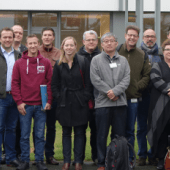INCASE

towards Industry 4.0 via Networked Control Applications and Sustainable Engineering
Priority Axis
Technological and Social InnovationSpecific objective
Technological Innovation
Lead partner
Universiteit GentContact
Start Date
01/09/2016End Date
31/12/2019Project budget
4 568 617 €ERDF amount
2 741 170 €ERDF rate
60%About
Common challenge
The challenge tackled by INCASE was to prepare the industrial economy (automation & manufacturing industry) for the future “Industry 4.0” (I4.0) and “Industrial Internet of Things” (IIoT). This is, in fact, crucial for high-wage countries which necessitate an increased level of computerization in the industry to facilitate small production series and interconnected factories.
The INCASE project took a focused approach to address this challenge by emphasizing the enhancement of manufacturing industries. Through the development and demonstration of key enabling automation technologies, the project aims to fortify the foundation for a seamless transition into the era of smart interconnected factories, smart buildings, and sustainable engineering.
Overall objective
Main outputs
Cross border approach
Main Achievements
INCASE came to an end in December 2019. The project developed pilots and performed research related to a selection of key automation technologies.
10 thematic demonstration trajectories were delivered with the aim of testing new technologies and showcase their feasibility to professionals and technicians in order to spread awareness and trigger early market uptake. Specific topics where demonstrators were developed are PROFICloud for connecting distant factories, stress-testing on PROFINet for creating reliable networks, power line communication as alternative communication network and high frequency power quality, networked control and integrated design, more specific mobile robotics, high-end hardware targets and co-simulation.
INCASE also developed pilots and performed research related to sustainable engineering. Specific topics were PROFIEnergy, communication & human machine interfacing in smart buildings and energy monitoring. The demonstrators based on these pilot setups were constructed and research was done on the setups to gain insight in the possibilities and limitations of those technologies.
Additionally, INCASE organised 34 technical events including where in-depth courses and technical lectures. 2305 people from 1174 companies attended at least a lecture. The average participant followed 2.6 lectures or events. Additionally, INCASE reached more than 700 people on 31 communication events with a general introduction on the project, a general introduction on Industry 4.0 technologies or a company visit.
Finally, the INCASE partners gained a lot of knowledge by cross border cooperation. A cross border setup demonstrated the possibilities of
industrial cloud applications and distant (cross border) measurements were possible. Knowledge on PROFIEnergy, EMC and cosimulation was shared among the partners, who spread the knowledge to the local industrial partners.
Testimonial

This interaction between start-ups, academic staff involved in INCASE, and students is a great way to both innovate and add value to a project. Moreover, it was valuable for us to work with experts in the field of robotics. Interacting with the consortium of INCASE has been very rewarding and a great way for us to innovate and enter the world of applied research for industrial projects.
